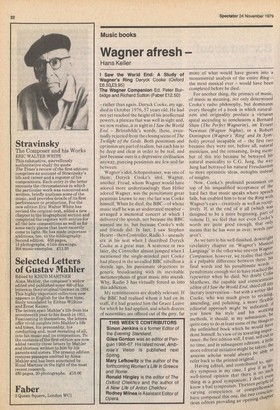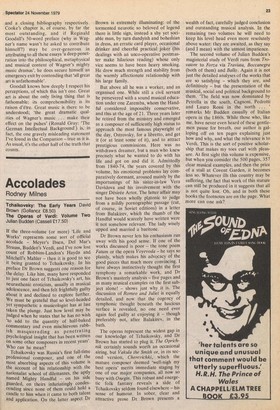Wagner afresh
Hans Keller
I Saw the World End: A Study of • Wagner's Ring Deryck Cooke (Oxford £6.50,£3.95) The Wagner Companion Ed. Peter Burbidge and,Richard Sutton (Faber £12.50) — rather than again. Deryck Cooke, my age, died in October 1976, 57 years old. He had not yet reached the height of his intellectual powers, a plateau that was well in sight and, we now realise, is in sight in /Saw the World End — Brtinnhilde's words, these, eventually rejected from the closing scene of The Twilight of the Gods. Both pessimism and optimism are part of realism, but each has to be deep and clear in order to be real, and just because ours is a depressive civilisation anyway, piercing pessimists are few and far between.
Wagner's idol, Schopenhauer, was one of them; Deryck Cooke's idol, Wagner, another. Freud, whom Wagner would have adored more understandingly than Hitler adored Wagner, was the penultimate great pessimist known to me; the last was Cooke himself. When he died, the BBC — of whose music staff he was an underrated member — arranged a memorial concert at which I delivered the speech, not because the BBC wanted me to, but because Cooke's wife and friends did. In fact, I saw Stephen Hearst —then Controller, Radio 3 — uneasily stir in his seat when I described Deryck Cooke as a great man. A sentence or two later, the Controller almost jumped when I mentioned the single-minded part Cooke had played in the so-called BBC rebellion a decade ago, his passionate objections to generic broadcasting with its inevitable metamorphosis of great music into muzak. Why, Radio 3 has virtually forced us into this addiction.
My reminiscences are doubly relevant. If the BBC had realised whom it had on its staff, if it had granted him the Grace Leave for which he had applied, and which dozens of nonentities are offered out of the grey, far
more of what would have grown into a monumental analysis of the entire Ring — the most musical ever — would have been completed before he died.
For another thing, the primacy of music, of music as meaning, not only determined Cooke's radio philosophy, but dominates every thought of a book in which naturalness and originality produce a virtuous spiral ascending to conclusions a Bernard Shaw (The Perfect Wagnerite), an Ernest Newman (Wagner Nights), or a Robert Donington (Wagner's 'Ring' and 1 is Symbols) proved incapable of — the first two because they were not, before all, natural musicians, and the remaining, living member of this trio because he betrayed his natural musicality to C.G. Jung, the way Jung had betrayed his natural Freudianism to more optimistic ideas, outsights instead, of insights. Now, Cooke's profound pessimism on top of his unqualified acceptance of the hard fact that music speaks where speech fails, has enabled him to hear the Ring with Wagner's ears — creatively as well as receptively. If, at the end of it all (which was designed to be a mere beginning, part Of volume I), we feel that not even Cooke's words are quite good enough, that 0111Y means that he has won us over: words just aren't. As we turn to his well-finished, downright revelatory chapter on 'Wagner's Musical Language' in the otherwise uneven Wagner Companion, however, we realise that there is a palpable difference between these, his final words and his penultimate words — penultimate enough not to have reached the typewriter when he died. No doubt Cohn Matthews, the capable and conscientious editor of! Saw the World End, shied off al like Cooke, rare, b y intervention was mionu—cbhut with a writer given to revising' given to revising'
amending, and polishing, a more flexipi editorial approach might be indicated: i
. t you knew his style and his work112! methods, il should, in my submission, ow' quite easy to do at least some of the things the unfinished book which he would hav..e . done himself. In view of its towering iraP.°irn tance, the first edition will, I trust, sell outlittle no time, and in subsequent editions, a more editorial initiative might be takebnle; anxious scholar would always be a refer back to the printed original, dry symposia in my. time, I give such Having edited, and contributedittossunrh; well-tested opinion that there do know eieveonf thing as a good symposium; know a bad symposium. Thirteen 13:0_1:ision varying competence or comipnriciEcpiein.. have composed this one, the two c
tious editors providing an open tious editors providing an open and a closing bibliography respectively. Cooke's chapter is, of course, by far the most outstanding, and if Reginald Goodall's 50-word preface (why in Wagner's name wasn't he asked to contribute himself?) may be over-generous in attributing to all these essays 'a deep penetration into the philosophical, metaphysical and musical content of Wagner's mighty music dramas', he does secure himself an emergency exit by contending that 'all great art is unfathomable'.
Goodall knows how deeply I respect his perceptions, of which this isn't one. Great art is about the only living thing that is fathomable: its comprehensibility is its raison d'etre. Great music is there to be understood; 'the great dramatic qualities of Wagner's music , .. make their effect on the pulses' (Ronald Gray: 'The German Intellectual Background') is, in fact, the one gravely misleading statement I've found in the Companion — true as it is. As usual, it's the other half of the truth that counts.



































 Previous page
Previous page